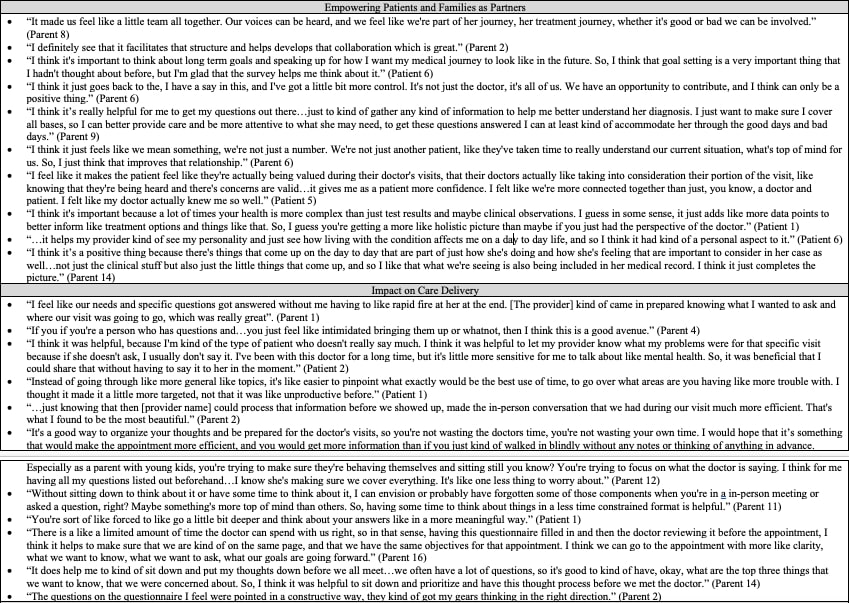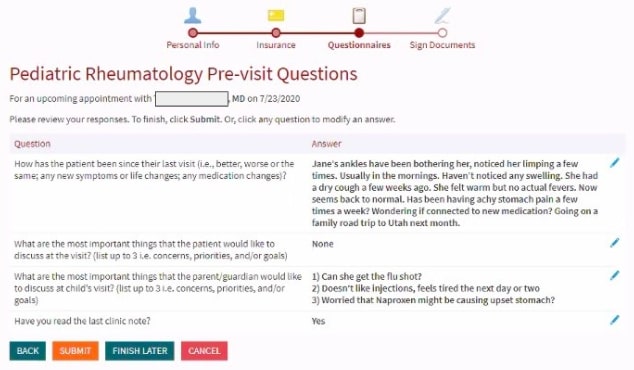Session Information
Date: Monday, November 8, 2021
Title: Health Services Research Poster II: Care Models and Innovation (1061–1082)
Session Type: Poster Session C
Session Time: 8:30AM-10:30AM
Background/Purpose: Health information transparency enabled by the widespread adoption of patient portals and open notes has truly transformed the way healthcare is delivered. However, broader applications of this technology are needed to promote meaningful team-based collaboration in a way that is interactive, personalized to the patient encounter, and facilitates joint decision-making regarding complex decisions. These aspects of care are particularly relevant in improving health outcomes among those with pediatric rheumatic conditions and aid in reducing the growing burden of disease in this population. Through this study, we introduced OurNotes, a portal-based pre-visit tool that leverages patient-generated health data, enabling patients and caregivers to actively contribute to their medical record and the co-generate clinical notes with their provider. We conducted a qualitative study exploring patient and caregiver experiences and attitudes related to the adoption of OurNotes in the pediatric rheumatology setting.
Methods: Patients and/or their caregivers were recruited as a convenience sample across four pediatric rheumatology ambulatory sites at Stanford Children’s Health, a tertiary care academic medical center. We conducted individual semi-structured interviews following participants’ clinic or telemedicine visits. Interviews were recorded and transcribed, and we employed an inductive reflexive thematic analysis approach outlined by Braun and Clark to analyze the data.
Results: Twenty-four participants (7 adult patients, 17 patient-caregiver dyads) were invited to participate in semi-structured interviews following their clinic or telemedicine visits. Patient diagnoses included juvenile idiopathic arthritis (JIA), systemic lupus erythematosus (SLE), juvenile dermatomyositis (JDM), and localized scleroderma, Inflammatory Bowel Disease-associated spondyloarthropathy. We identified four major themes and ten sub-themes that characterized patient and caregiver experiences, attitudes and perceptions on how OurNotes may foster strategies for enhancing their rheumatology care experience. Major themes included Empowering Patients and Families as Partners, Impact on Care Delivery, Information Impact, and User Experience. The results are summarized concisely in Table 1 with supportive illustrative excerpts.
Conclusion: OurNotes represents a novel application of the electronic health record that has the potential to bridge inefficiencies in care among patients and families with chronic rheumatic conditions by enhancing information flow, fostering active collaboration and supporting more personalized and productive care interactions. Clinical transparency and inclusivity afforded by this approach empowered patients and families to effectively participate in care with greater autonomy in decision-making. Participants also endorsed a better understanding of their care, improved dialogue during visits and greater trust and satisfaction with their providers. More research is needed to demonstrate the best practices of OurNotes, paying special attention to clinical workflow integration, equitable access, and patient privacy and confidentiality.
 Themes and Illustrative Quotes
Themes and Illustrative Quotes
 Themes and Illustrative Quotes
Themes and Illustrative Quotes
To cite this abstract in AMA style:
Khalsa U, Pooni R, Sandborg C, Balboni I, Wayman K, Lee T. Supporting Patient-Centered Care in the Pediatric Rheumatology Setting: Patient, Family and Provider Experiences with OurNotes [abstract]. Arthritis Rheumatol. 2021; 73 (suppl 9). https://acrabstracts.org/abstract/supporting-patient-centered-care-in-the-pediatric-rheumatology-setting-patient-family-and-provider-experiences-with-ournotes/. Accessed .« Back to ACR Convergence 2021
ACR Meeting Abstracts - https://acrabstracts.org/abstract/supporting-patient-centered-care-in-the-pediatric-rheumatology-setting-patient-family-and-provider-experiences-with-ournotes/

